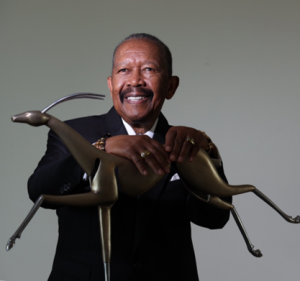John E. Jacob Announces the Release of His Debut Book, I Will F.E.A.R. No Evil
John E. Jacob, former President and CEO of the National Urban League and a lifelong advocate for racial equality and leadership, has announced the release of his debut book, I Will F.E.A.R. No Evil, through his social media platforms.
In this compelling memoir, Jacob reflects on a transformative era in American history, particularly the missed opportunities during the Reagan and Bush administrations of the 1980s and early 1990s. As the head of the National Urban League, he tirelessly advocated for education and job training programs to empower marginalized communities for the challenges of the twenty-first century. Under his leadership, the League, along with other progressive organizations, successfully opposed key Reagan-era policies, achieving landmark victories such as the establishment of Martin Luther King, Jr. Day and shaping the U.S. stance against apartheid in South Africa. These efforts contributed to increased Black political mobilization, ultimately laying the groundwork for milestones such as the elections of Bill Clinton and Barack Obama.
When asked about his motivation for writing the book, Jacob stated, "I wanted to reflect on the need for education and job training to prepare marginalized communities for the future. More importantly, I wanted to inspire action to address racial and economic disparities that continue to disadvantage people of color."
I Will F.E.A.R. No Evil underscores the enduring power of leadership, coalition-building, and advocacy in the fight for social and economic justice.
The book is now available for purchase on Amazon.
About John E. Jacob
John E. Jacob had distinguished careers as a corporate executive and U.S. civil rights leader. He was Executive VP and Chief Communications Officer at Anheuser-Busch (1994-2008), serving on its Board and key committees. Reporting to Chairman August Busch III, he played a vital role in U.S. and international business. Jacob also served on 16+ corporate and charitable boards, including Morgan Stanley, Coca-Cola Enterprises, and The Drucker Foundation. He retired from Anheuser-Busch in 2008.
Richard Bard
Gnome Book Writing
email us here
Visit us on social media:
Facebook
X
Instagram
TikTok
Legal Disclaimer:
EIN Presswire provides this news content "as is" without warranty of any kind. We do not accept any responsibility or liability for the accuracy, content, images, videos, licenses, completeness, legality, or reliability of the information contained in this article. If you have any complaints or copyright issues related to this article, kindly contact the author above.
SoftwareWorld Now Provides Reputation-Based Short Reviews for All Popular Software Tools
Mobility City of Chicago IL Provides Fast, Trusted Mobility Equipment Repair Services for Veterans Across Chicagoland
Mobility City of New Orleans Provides Veterans with Mobility Equipment Repair Service Completed in Under Five Days
Więcej ważnych informacji
 Jedynka Newserii
Jedynka Newserii

 Jedynka Newserii
Jedynka Newserii

Problemy społeczne

Sukces gospodarczy Polski może zachęcić do powrotów Polaków mieszkających za granicą. Nowa rządowa strategia ma w tym pomóc
Polska coraz mocniej stawia na powroty swoich obywateli z zagranicy. Rządowa strategia współpracy z Polonią na najbliższe lata zakłada system zachęt dla osób powracających, ale też ułatwienia w uznawaniu wykształcenia i kwalifikacji, podejmowaniu studiów czy staży zawodowych. To w obliczu rosnących wyzwań demograficznych i zapotrzebowania na wysoko wykwalifikowaną kadrę szansa na wzmocnienie rynku pracy. Napływ wykwalifikowanych specjalistów z doświadczeniem zdobytym za granicą może pomóc w modernizacji krajowej gospodarki.
Prawo
ZPP: Działania administracji narażają na szwank wysiłek deregulacyjny. Niektóre niosą znamiona dyskryminacji i nękania przedsiębiorców

Choć rząd zgodnie z zapowiedziami realizuje szeroko zakrojone zmiany deregulacyjne, przedsiębiorcy alarmują, że brakuje w nich spójności, przewidywalności i realnej poprawy, zwłaszcza w kontaktach z administracją. Jako przykład ZPP podaje przypadek firmy British American Tobacco (BAT) i jej zatrzymanego przez izbę celno-skarbową zamówienia 200 tys. kartridży do e-papierosów. Dotknięte tą decyzją spółki liczą straty.
Konsument
Branża piwowarska dodaje do polskiej gospodarki ponad 20,5 mld zł rocznie. Spadki sprzedaży i produkcji piwa uderzają również w inne sektory

Branża piwowarska pozostaje ważnym ogniwem polskiej gospodarki. Nowy raport CASE wskazuje, że generuje ona 3 proc. dochodów budżetowych i 85 tys. miejsc pracy w samych browarach i innych powiązanych sektorach. Dlatego kurczący się rynek piwa może mieć poważne reperkusje – już dziś nadwyżka mocy produkcyjnych przekracza 10 mln hl. Spadki są spowodowane m.in. znaczącym wzrostem kosztów działalności, spadkiem konsumpcji, a także uderzającymi w browarników zmianami regulacyjnymi.
Partner serwisu
Szkolenia

Akademia Newserii
Akademia Newserii to projekt, w ramach którego najlepsi polscy dziennikarze biznesowi, giełdowi oraz lifestylowi, a także szkoleniowcy z wieloletnim doświadczeniem dzielą się swoją wiedzą nt. pracy z mediami.










.gif)

 |
| |
| |
|